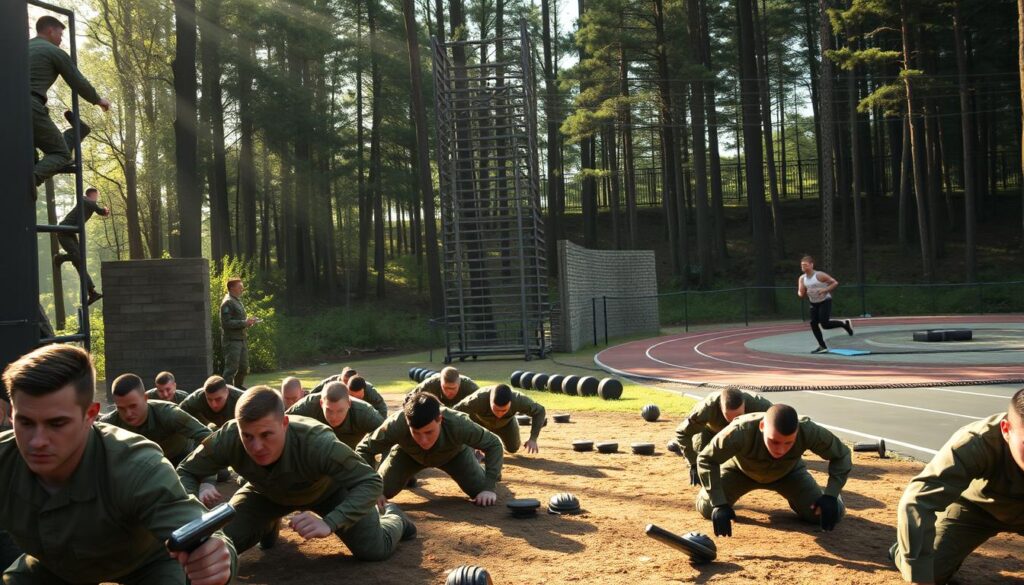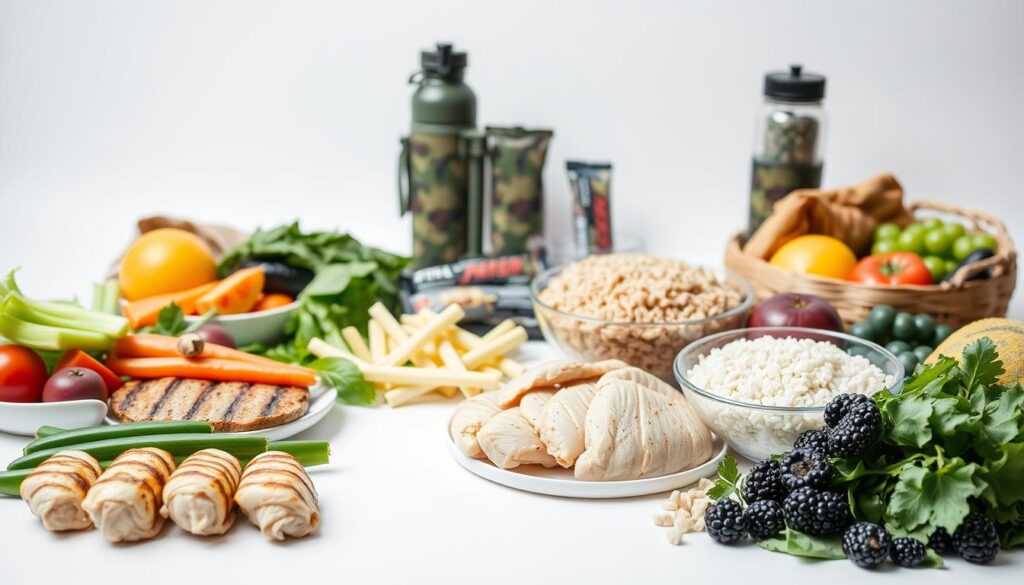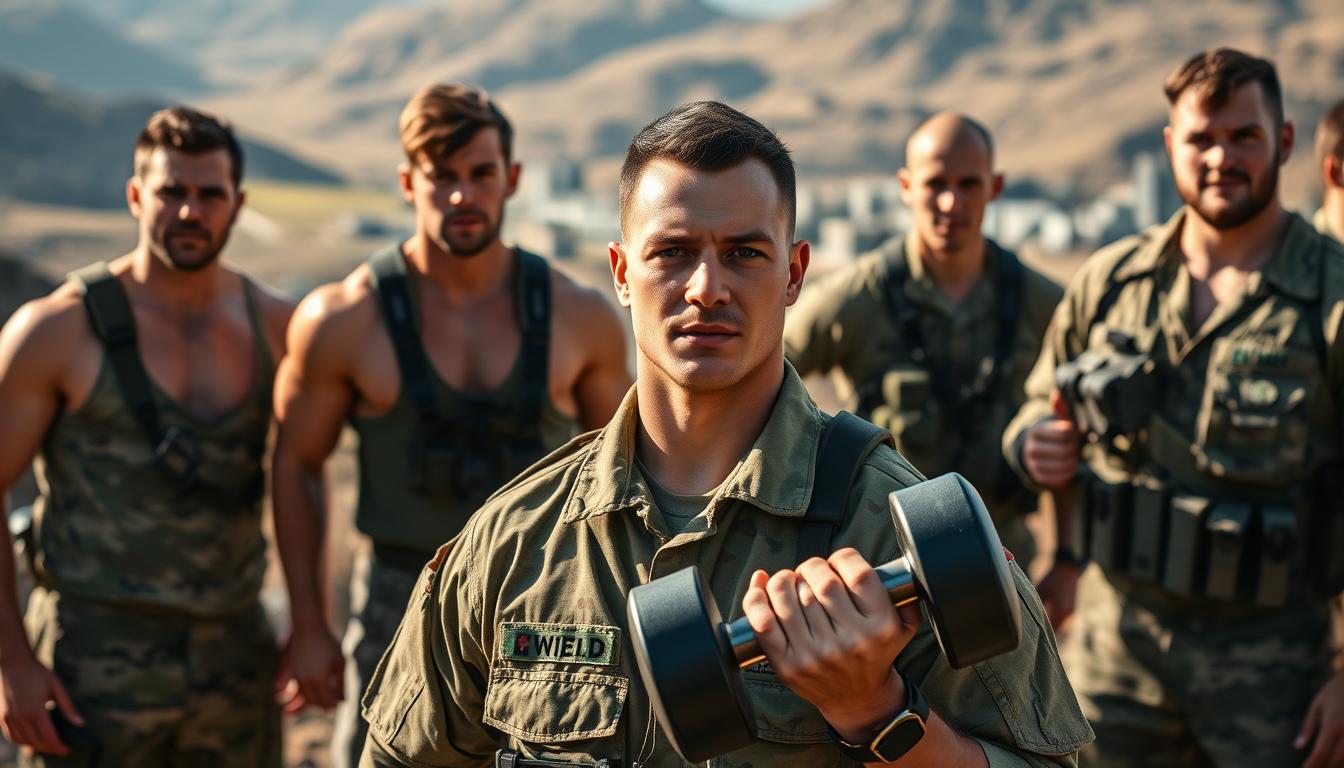Can rising obesity rates in the U.S. hurt the future of military service? The answer is yes, it does. This is because Army recruits face big challenges in meeting the physical demands of service.
The obesity problem has made it harder for the military to find enough recruits. This is because fewer people are fit enough to join. So, there’s a big need for military weight loss tips to help recruits get in shape.
The Army has started new programs to tackle this issue. These programs focus on weight loss and getting fit. They aim to help recruits reach their goals and finish their training successfully.
Key Takeaways
- Obesity rates are affecting military recruiting numbers.
- The Army is implementing new initiatives to support weight loss and fitness.
- Effective weight loss strategies are crucial for recruits to meet service requirements.
- The military is adapting to the obesity epidemic with targeted programs.
- Recruits need support in achieving fitness goals to successfully complete training.
Understanding Army Fitness Standards
The Army has strict fitness standards for recruits. These standards help ensure they’re ready for military life. They’re key for Basic Combat Training (BCT) success and Army performance.
Importance of Physical Readiness
Physical readiness is vital for military readiness. Recruits must be fit to do their jobs well. The Army’s fitness program boosts endurance, strength, and agility.
Being physically ready is crucial. It affects a recruit’s training and job performance. A good fitness program lowers injury risk and boosts performance.
The Role of Weight in Recruitment
Weight is a big factor in fitness. The Army has weight standards based on height, age, and gender. A healthy weight is key for optimal physical performance and injury prevention.
Those who are too heavy or light may struggle with Army standards. So, it’s important to aim for a healthy weight before joining.
Key Physical Tests Recruits Must Pass
Recruits must pass several physical tests. These tests show their fitness level. The tests include:
- The Army Combat Fitness Test (ACFT)
- The Army Body Composition Program (ABCP)
- Endurance tests, such as the 2-mile run
The ACFT tests strength, endurance, and agility. It includes squat, deadlift, and sprint-drag-carry. The ABCP checks body fat percentage to ensure weight standards are met.
| Test Event | Description | Scoring |
|---|---|---|
| 3 Repetition Maximum Deadlift | Measures strength | Based on weight lifted |
| Sprint-Drag-Carry | Assesses agility and endurance | Based on completion time |
| 2-Mile Run | Measures endurance | Based on completion time |
The Army has updated its fitness programs. The ARMS2.0 test is now part of the Future Soldier Preparatory Course at Fort Jackson, South Carolina. This shows the Army’s dedication to preparing recruits.

In conclusion, meeting Army fitness standards is crucial for success. Focus on physical readiness, maintain a healthy weight, and pass key tests. This ensures recruits are ready for military life’s demands.
Nutrition Strategies for Recruits
Army recruits greatly benefit from good nutrition. A well-planned diet helps them meet physical readiness goals and perform better in training.
Balanced Diet Fundamentals
A balanced diet for recruits has the right mix of nutrients. The U.S. Department of Agriculture’s MyPlate model helps them understand food group proportions. Registered dietitians teach these basics in nutrition classes.
The Army’s Go for Green food labeling helps recruits choose healthier options. It labels foods based on their nutritional value, making it easier to make good choices.

Meal Planning for Optimal Weight Loss
Meal planning is key for recruits wanting to lose weight. It means eating fewer calories than you burn, but still getting enough nutrients for training.
- Eat whole, unprocessed foods like fruits, veggies, whole grains, lean proteins, and healthy fats.
- Limit sugary drinks and foods high in added sugars, salt, and saturated fats.
- Drink plenty of water all day, especially after working out.
Hydration’s Role in Weight Management
Hydration is crucial for weight management and performance. Even a little dehydration can make you tired, dizzy, and less athletic. Recruits should drink water often, especially after hard workouts.
| Hydration Tips | Benefits |
|---|---|
| Drink at least 8-10 glasses of water per day | Maintains fluid balance |
| Monitor urine color to assess hydration level | Ensures proper hydration status |
| Avoid sugary drinks and caffeine | Reduces calorie intake and prevents dehydration |
Exercise Regimens for Effective Weight Loss
A good exercise plan is key for recruits to lose weight and get fit. The Army’s fitness program is detailed. It uses different methods to help recruits reach fitness goals.
Cardio Workouts to Boost Fat Loss
Cardio exercises are a big part of the Army’s fitness plan. They help improve endurance and burn fat. Recruits do activities like running, swimming, and cycling to boost their heart health.
The Army suggests adding low-impact cardio and high-intensity circuit training to workouts. These help burn calories and make the heart work better.
Strength Training for Muscle Preservation
Strength training is also important in the Army’s program. It helps keep muscle while losing weight. Recruits do strength exercises to build and keep muscle strength.
Strength training boosts the metabolic rate. This means the body burns more calories even when resting. For more on failing the Army weight standard, check this resource.
Incorporating Interval Training
Interval training is a key Army method for better fitness and weight loss. It involves short, intense workouts followed by rest.
Interval training boosts heart health and muscle endurance. It’s a great way to burn calories and improve physical performance. It’s a big part of the Army’s workout plan.
The Psychological Aspect of Weight Loss
For army recruits, losing weight is as much about mental strength as physical training. The army’s weight loss program is tough. It tests recruits’ physical and mental limits.
Setting Realistic Goals
Setting realistic goals is a key strategy for weight loss. Recruits aim for achievable milestones in weight loss and fitness. This keeps them motivated and tracks their progress.
- Short-term goals help recruits stay focused on immediate objectives.
- Long-term goals provide a vision for overall success in their weight loss journey.
Overcoming Mental Barriers
Recruits face big mental challenges during weight loss. The army helps with cognitive skills training. This training helps recruits bounce back from disappointment and build mental strength.
- Identifying negative thought patterns is the first step towards overcoming mental barriers.
- Developing coping strategies helps recruits manage stress and stay on track.
Motivation Techniques for Recruits
Motivation is key for recruits losing weight. The army uses motivation techniques like positive reinforcement and team activities. Recruits also support each other, building camaraderie.
The army’s weight loss program combines physical and mental training. This approach prepares recruits for success. They become both physically and mentally strong.
Utilizing Army Resources for Weight Management
The Army focuses on health and fitness in a big way. It has many tools for managing weight. The Army’s Holistic Health and Fitness teams use a team effort to help with weight loss and better performance.
Access to Nutritionists and Fitness Experts
Recruits get to work with nutritionists and fitness experts. They offer one-on-one advice on diet and exercise. This ensures each recruit gets a plan that fits their needs, helping them reach their weight loss goals.
Nutritionists teach about balanced diets and meal planning. fitness experts create workout plans that help with weight loss and keep muscles strong.
Group Workouts and Support Systems
Group workouts are key in the Army’s fitness program. They build friendship and motivation among recruits. Trained instructors lead these sessions, making sure recruits do exercises right and safely.
The Army also values support systems. Recruits get a network of peers and mentors who know the weight loss and fitness challenges.
Training Camps and Boot Camps
The Army has training camps and boot camps for intense fitness and weight loss. These programs push recruits hard, helping them build strength and lose weight.
Using these resources, recruits can keep up with their weight loss goals. They learn habits that help them in their military careers and beyond.
Tracking Progress and Adjustments
Trainees should keep a close eye on their progress. They need to adjust their diet and exercise plans as needed. A good military training diet is key in this process.
Monitoring Weight Changes
Regular weight checks and body measurements are important. They help recruits see how they’re doing. By tracking their weight and body composition, they can spot areas for improvement.
Understanding Body Composition
It’s not just about losing weight. It’s about losing fat while keeping muscle mass. Knowing body composition helps recruits fine-tune their diet and exercise plans.
Adjusting Plans
Recruits can make smart choices based on their data. They might change their nutrition or work out harder. This helps them get the best results.


